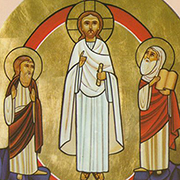This is a meditation on the passage of ‘The Woman at the Well’ (John 4:5-42) using a method of praying with scripture taught by Saint Ignatius.
Today I’m going to try something different. Instead of giving a Carmelite-themed homily for this Third Sunday of Lent – the passage is ‘The Woman at the Well’ from John’s Gospel – I’m going to give an Ignatian Guided Meditation. It’s a way Ignatius, Saint Ignatius, teaches us to pray with scripture. He says, ‘immerse yourself in the passage; engage all the senses.’ What does it smell like? What do you see? What do you hear? Engage your senses and immerse yourself in. Then lean in and listen to what Jesus might have to tell you. So let us begin…
We’re in Samaria; you’re in Samaria. It’s noon. You’ve been walking all morning and you’re tired. It’s hot. You sit down on a rock near the well. Jesus is sitting at the well. You’re thirsty; very thirsty, and he’s doing nothing about getting water. But then this woman comes up. And you can hear her jewels and her bracelets clanking as she’s walking. And you’re thinking, ‘what is she doing here? No one is at the well this time of day.’ And she sits down near Jesus and you can hear them, but not hear them distinctly, talking to each other. That’s because the wind which is so hot (it’s midday) is blowing against your ears. That’s what you hear more than their talking – the wind. Where did those disciples go? Oh yeah, Jesus sent them into town. So it’s just you, her, and Jesus. You smell the heat on the rocks. You smell some perfume. Is that her perfume? She’s wearing perfume in the middle of the day! All of a sudden she runs off and then Jesus turns to you and says to you, ‘and what are you here for? what are you looking for?’ And you say to Jesus:






